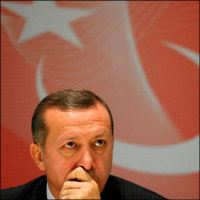Registration
You will receive an email confirming your registration.
IMGXYZ1261IMGZYXTurkey’s diplomatic role in the Middle East has grown in recent years, especially as a mediator in the Israel-Syria talks. It assumed the monthly rotating presidency of the UN Security Council this June, providing it with an opportunity to expand its diplomatic presence on the world stage. Following considerable resistance to its EU candidacy, however, Turkey's desire to become an EU member state appears to have diminished.
Turkey is currently in the process of redefining its identity as a global actor, leaving observers to speculate on its future relations with the Middle East, the EU and indeed, the U.S.
Carnegie’s Henri Barkey and Heather Grabbe, Director of the Open Society Institute Brussels, led a discussion on the opportunities available for cooperation between Turkey and Europe on issues of global importance, particularly in the Middle East.
Highlights included…
- Barkey explained that there has been a shift in the way Turkey pursues its role on the international stage. Since the AKP came to power in 2002, Turkey has overestimated its influence and capability in issues of foreign policy, particularly in its neighbouring countries where it has relied largely on the historical relevance of the Ottoman empire.
- Grabbe suggested that Turkey’s bid for EU membership is strengthened by its good relations with its neighbors in the Middle East, which would make Turkey a valuable ally for advancing EU interests in the region.
- Barkey argued that it will be necessary for the United States and Europe to become actively involved in creating the conditions for peace between Turkey and the Kurds.
